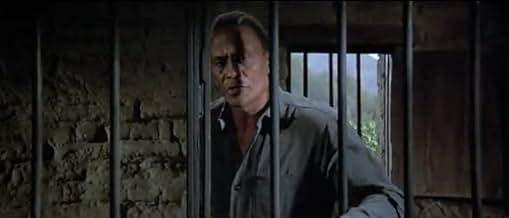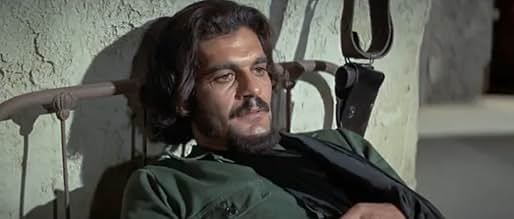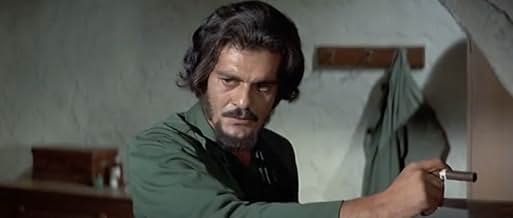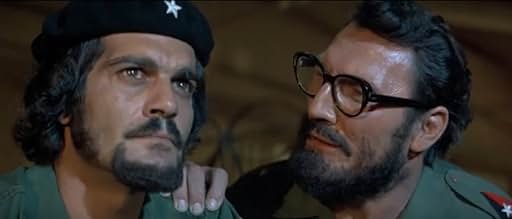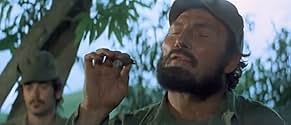AVALIAÇÃO DA IMDb
4,8/10
1,1 mil
SUA AVALIAÇÃO
Adicionar um enredo no seu idiomaAn intentionally noncommittal version of the Cuban revolution told through flashbacks, the film recounts Che's switch from doctor to politico in Castro's campaign.An intentionally noncommittal version of the Cuban revolution told through flashbacks, the film recounts Che's switch from doctor to politico in Castro's campaign.An intentionally noncommittal version of the Cuban revolution told through flashbacks, the film recounts Che's switch from doctor to politico in Castro's campaign.
- Direção
- Roteiristas
- Artistas
BarBara Luna
- Anita Marquez
- (as Barbara Luna)
Avaliações em destaque
Events in the life of revolutionary Che Guevara(Omar Sharif) from his landing in Cuba in 1956 to his death in Bolivia in 1967. Director Richard Fleischer's 1969 film was made a year after another film about Che, and is a potted account and character study of the asthmatic doctor from Argentina and his motivations, which feature to camera comments and opinions from people who knew him,as well as black and white documentary footage of the Cuban missile crisis(which this film claims Che started). It's also a story of the revolution gone sour, at least in the mountains of Bolivia. Not bad as drama between the two leads, but Jack Palance (as the cigar chewing Fidel Castro) is a little too old to play Fidel.
This film was almost hooted into oblivion by the critics at the time of its release, so when I saw it on one of the Cinemax channels last night, I was surprised that it wasn't much worse. A few months ago I saw the highly acclaimed docudrama on Fidel on Showtime, and this film, while not as good as the Showtime drama, is not all that much worse either.
First the bad stuff. Jack Palance's portrayal of Fidel Castro must rank as one of the worst performances ever to appear on screen. During the first half of the film, he spends most of the time rolling a lit cigar around in his mouth and making weird facial grimaces, most of which he seems to have forgotten by the second half. Moreover, he makes Castro come across as a dim-witted doofus who is always helped to see the right course by the brilliant Che, rather than portraying Castro as the brilliant strategist and tactician he was. Secondly, although the film is in English, much of the spoken dialogue sounds like a dubbed movie. Maybe that's because one of the principal supporting actors is Italian.
That having been said, the film's history is, quite surprisingly, fairly accurate. It accurately depicts how Castro's forces were almost completely wiped out after the arrival from Mexico, and Castro was left with a force numbering less than twenty. Nevertheless, he survives and gradually wins the support of the peasants, so that eventually he has a guerrilla force numbering in the thousands. The fact that Guevara was unable to pull off the same feat in Bolivia, due largely to his own megalomania that prevented his listening to the Bolivian peasants, is accurately portrayed as well. This isn't available on video and isn't likely to come to a theater, so you can probably see it only on cable. If it comes along, it's worth a watch.
First the bad stuff. Jack Palance's portrayal of Fidel Castro must rank as one of the worst performances ever to appear on screen. During the first half of the film, he spends most of the time rolling a lit cigar around in his mouth and making weird facial grimaces, most of which he seems to have forgotten by the second half. Moreover, he makes Castro come across as a dim-witted doofus who is always helped to see the right course by the brilliant Che, rather than portraying Castro as the brilliant strategist and tactician he was. Secondly, although the film is in English, much of the spoken dialogue sounds like a dubbed movie. Maybe that's because one of the principal supporting actors is Italian.
That having been said, the film's history is, quite surprisingly, fairly accurate. It accurately depicts how Castro's forces were almost completely wiped out after the arrival from Mexico, and Castro was left with a force numbering less than twenty. Nevertheless, he survives and gradually wins the support of the peasants, so that eventually he has a guerrilla force numbering in the thousands. The fact that Guevara was unable to pull off the same feat in Bolivia, due largely to his own megalomania that prevented his listening to the Bolivian peasants, is accurately portrayed as well. This isn't available on video and isn't likely to come to a theater, so you can probably see it only on cable. If it comes along, it's worth a watch.
It was brave of the makers of this film to release it in 1969 when the U.S. war against Communist North Vietnam still raged. It does depict a **failed** attempt to foment revolution in the Third World and on balance it is a negative portrayal of a professional revolutionary. Given the times, any depiction of Guevara and Fidel Castro showing them as human was a bold move.
In the U.S. most publicity has been garnered by Castro's bitterest enemies (those wonderful folks who brought you the **Elian** affair). Fidel has his supporters here, and around the world, also. Many of them seem to have posted comments at this site. The title of this movie is "Che!", not "Fidel!". Naturally, Castro's role will be a secondary one, a decision Castro's supporters seem unable to forgive.
Everyone knows how the story ends, and that is where the movie starts, with Che Guevara's body being transported by helicopter down from the one-room schoolhouse where he was apparently executed after being wounded and captured by an elite unit of the Bolivian Army. It's a strikingly beautiful, almost elegiac shot with the slopes of the Andes stretching to the horizon in the background. The movie proceeds in a semi-documentary style, the story told in flashbacks by Guevara's old Comrades (and some old enemies). Some of the Comrades, visibly aged, give their interviews from prison cells.
While Guevara's early life in Argentina isn't depicted, there is a soundless, striking scene early in the film of Cuban women protesting the dictatorial Battista regime, only to be massacred by Cuban soldiers ("We heard you calling, Cuba and we came...") that well explains what motivated young Ernesto and other youths from Latin America's upper classes to join the Cuban revolutionaries. From there we trace Che's transformation from idealistic medical graduate to hardened guerrilla fighter--summed up in a moment when in the heat of battle he picks up a rifle and leaves his doctor's kit on the ground.
I also disagree with the many criticisms of the portrayal of Fidel Castro by Jack Palance. Palance's movie career was distinctly on the down slope when he accepted the part, but he always had **macho**. Here he captured the 6'4" Castro's dominating physical presence in a land of mostly short statured people.
It is a real pity that this motion picture has completely disappeared. There is not a commercial version of it available anywhere. In the future, perhaps after Omar Sharif has died, this portrait of one of the twentieth century's most charismatic figures will be recognized as the rare achievement it is.
In the U.S. most publicity has been garnered by Castro's bitterest enemies (those wonderful folks who brought you the **Elian** affair). Fidel has his supporters here, and around the world, also. Many of them seem to have posted comments at this site. The title of this movie is "Che!", not "Fidel!". Naturally, Castro's role will be a secondary one, a decision Castro's supporters seem unable to forgive.
Everyone knows how the story ends, and that is where the movie starts, with Che Guevara's body being transported by helicopter down from the one-room schoolhouse where he was apparently executed after being wounded and captured by an elite unit of the Bolivian Army. It's a strikingly beautiful, almost elegiac shot with the slopes of the Andes stretching to the horizon in the background. The movie proceeds in a semi-documentary style, the story told in flashbacks by Guevara's old Comrades (and some old enemies). Some of the Comrades, visibly aged, give their interviews from prison cells.
While Guevara's early life in Argentina isn't depicted, there is a soundless, striking scene early in the film of Cuban women protesting the dictatorial Battista regime, only to be massacred by Cuban soldiers ("We heard you calling, Cuba and we came...") that well explains what motivated young Ernesto and other youths from Latin America's upper classes to join the Cuban revolutionaries. From there we trace Che's transformation from idealistic medical graduate to hardened guerrilla fighter--summed up in a moment when in the heat of battle he picks up a rifle and leaves his doctor's kit on the ground.
I also disagree with the many criticisms of the portrayal of Fidel Castro by Jack Palance. Palance's movie career was distinctly on the down slope when he accepted the part, but he always had **macho**. Here he captured the 6'4" Castro's dominating physical presence in a land of mostly short statured people.
It is a real pity that this motion picture has completely disappeared. There is not a commercial version of it available anywhere. In the future, perhaps after Omar Sharif has died, this portrait of one of the twentieth century's most charismatic figures will be recognized as the rare achievement it is.
If you are determined to see CHE! no matter what, I highly suggest you first pick up and read a good book about the man, Fidel Castro, and the Cuban revolution itself. Otherwise, you'll be utterly confused. The movie starts with the rebel invasion of Cuba, without giving us any idea about what Che had been doing up to that point of time. (Like: Why was he convinced to follow Castro?) We also don't really see what the political situation was exactly like in Cuba at the time. (How can we understand the rebels if we don't know what they are fighting against?) The movie continues to be confusing by subsequently not making it clear just how the rebels were able to build in force after being almost completely wiped out... or just how exactly they were able to weaken the government forces... or how Che transformed from a weakling into a strong leader (it seems to happen overnight!)... or why exactly Che got tired of being in Cuba.
The subsequent unfolding events do get somewhat clearer once Che gets to Bolivia and starts his doomed campaign there, but you still don't understand the man. And with Richard Fleischer at the helm - a director who was usually only as good as his script - the movie sinks deeper into badness. The fact that Fleischer shows a complete inablility to film action scenes is just the least of his problems.
And talk about miscasting! Omar Sharif as Che?!? He looks understandably confused and cowed in the role - deadly for someone who was reportedly a charismatic and cunning leader. But his performance is brilliant next to that of Jack Palance. Palance is unbelievably goofy as Castro, who was a strong leader in his own right. Reports at the time of filming state that Palance asked that Castro's "buffoonery" in the script be changed. Apparently that didn't happen. I can imagine that Palance subsequently decided to take revenge by hamming things up, especially since he also stated to the press after filming that he regretted ever being involved in this production.
The subsequent unfolding events do get somewhat clearer once Che gets to Bolivia and starts his doomed campaign there, but you still don't understand the man. And with Richard Fleischer at the helm - a director who was usually only as good as his script - the movie sinks deeper into badness. The fact that Fleischer shows a complete inablility to film action scenes is just the least of his problems.
And talk about miscasting! Omar Sharif as Che?!? He looks understandably confused and cowed in the role - deadly for someone who was reportedly a charismatic and cunning leader. But his performance is brilliant next to that of Jack Palance. Palance is unbelievably goofy as Castro, who was a strong leader in his own right. Reports at the time of filming state that Palance asked that Castro's "buffoonery" in the script be changed. Apparently that didn't happen. I can imagine that Palance subsequently decided to take revenge by hamming things up, especially since he also stated to the press after filming that he regretted ever being involved in this production.
Superficial biographical flick about international revolutionary and Castro's second in command Che Guevara, Omar Sharif. The movie gives you the impression that if it wasn't for Che Fidel Castro, Jack Palance, would never have taken over Cuba in what's called the Great Peasant Revolution of 1959. Che, an Argentinian doctor and one-world revolutionary, did in fact land with Castro and his contingent of 82 men off the west coast of Cuba on December 2, 1956.
After being ambushed by Batista's, the Cuban dictator, men only a dozen, including Che & Castro, survived. During the next two years in the Sierra Maestras mountains the dozen revolutionaries grew into the thousands. It was undoubtedly because of the leadership and knowledge of guerrilla tactics and warfare by Che that forced the besieged and defeated Batista to abandon his palace in Havana on New Years Eve 1959 and check out of the country. This left a victorious Castro & Co. to enter the capital city without as much as a shot being fired on New Years Day.
The movie shows how Che became a ruthless and blood-thirsty disciplinarian to the troops. Che as a command-ante is shown without as much as flinching ordering the execution of traitors, many times in the movie doing it himself, that even his leader Fidel didn't have the heart to do. After the Castro take-over of Cuba Che held around the clock military trials and executions of former Batista political and military personal. This even shocked and outraged some of the most battle-hardened Cuban revolutionaries. Che's excuse for his cold-blooded policies was that if he didn't show the people that he was ridding the country of Bitista's war criminals they would do the job for him themselves. This would result in many innocent, far more then those proved guilty by his military tribunals, people ending up being slaughtered by rampaging mindless and vengeful mobs.
The movie "Che" goes on to show that it was Che who gave Fidel Castro the idea of not only declaring himself a Marxist which outraged the United States Government and turned it against him but in establishing diplomatic and military relations with the Soviet Union. This lead to the 1961 fiasco, for the US and Free Cubans, known as "the Bay of Pigs". Were also show that it was Che who planted the idea in Fidel's head to invite the Soviet Union to use Cuba as a base for it's nuclear missiles. This irresponsible action, on Castro and the USSR's part, almost brought the world to the brink of nuclear war in the autumn of 1962.
Feeling betrayed by his friend Fidel and his Soviet allies for backing down to the US during the Cuban Missile Crisis Che, calling Castro a Soviet dupe, decided to leave the safety of Cuba and go out in the dangerous hills and valleys of Bolivia to start a revolution of his own. Since in reality Che left for Bolivia in late 1966 or early 1967 the event, in the movie, of Che's break with Castro,in 1962, seems a bit premature.
In Bolivia Che lost his revolutionary persona as well as his ability to rally peasants, like he did in Cuba ten years earlier, to his aid. Going against his own writings and principles about how a guerrilla/revolutionary war should be fought had Che's men, mostly Bolivian rebels, desert him because of his mindless and brutal tactics to whip up both support and recruits among the peasant population.
The hard life as a guerrilla fighter coupled with his deteriorating asthmatic condition, smoking Cuban cigars didn't help Che's asthma either, took a heavy toll on Che's health. Fate eventually caught up with Che as well as the Bolivian army and on October 9, 1967 in an ambush at the Quebrada del Yuro ravine the life-long revolutionary was shot and captured. Later, on orders from the Bolivian high command, Che was executed as if he were just a common criminal not the man who's name became synonymous with world as well as local revolution over the last thirty five years.
More of a curiosity piece then anything else "Che" has it's share of unintentional laughs. Omar Sharif in many of the battle and strenuous jungle mountain climbing scenes in the movie is heard breathing and wheezing, because of his asthma condition, like someone making an obscene phone-call. The final scene when Che's confronted by an elderly Bolivian peasant berating him about how his guerrilla actions in and around his village have caused his goats to cease from giving milk. The scene looks like something straight out of a Mystery Science 3000 parody of an unintentionally and hilariously funny movie.
Jack Palance as Fidel Castro with his fake plastic nose and acting as if he'd be lost without Che makes the guy, Castro, look like a totally helpless dolt as well as alcoholic buffoon. Castro who seems to drink as many bottles of booze as the cigars that he smokes that it's a wonder that he's still around now; some forty after Che left him to run Cuba on his own!
At the time of the movies release in the spring of 1969 there were plans by many Cuban/Americans to demonstrate in front of the movie-houses that were to be playing "Che". It wasn't until after word of mouth, as well as critics reviews, about how awful the film really was that it was decided that "Che" instead of ingratiating Castro's Cuba was in fact the United States revenge for it's defeat by Castro's army and militia at "the Bay of Pigs"!
After being ambushed by Batista's, the Cuban dictator, men only a dozen, including Che & Castro, survived. During the next two years in the Sierra Maestras mountains the dozen revolutionaries grew into the thousands. It was undoubtedly because of the leadership and knowledge of guerrilla tactics and warfare by Che that forced the besieged and defeated Batista to abandon his palace in Havana on New Years Eve 1959 and check out of the country. This left a victorious Castro & Co. to enter the capital city without as much as a shot being fired on New Years Day.
The movie shows how Che became a ruthless and blood-thirsty disciplinarian to the troops. Che as a command-ante is shown without as much as flinching ordering the execution of traitors, many times in the movie doing it himself, that even his leader Fidel didn't have the heart to do. After the Castro take-over of Cuba Che held around the clock military trials and executions of former Batista political and military personal. This even shocked and outraged some of the most battle-hardened Cuban revolutionaries. Che's excuse for his cold-blooded policies was that if he didn't show the people that he was ridding the country of Bitista's war criminals they would do the job for him themselves. This would result in many innocent, far more then those proved guilty by his military tribunals, people ending up being slaughtered by rampaging mindless and vengeful mobs.
The movie "Che" goes on to show that it was Che who gave Fidel Castro the idea of not only declaring himself a Marxist which outraged the United States Government and turned it against him but in establishing diplomatic and military relations with the Soviet Union. This lead to the 1961 fiasco, for the US and Free Cubans, known as "the Bay of Pigs". Were also show that it was Che who planted the idea in Fidel's head to invite the Soviet Union to use Cuba as a base for it's nuclear missiles. This irresponsible action, on Castro and the USSR's part, almost brought the world to the brink of nuclear war in the autumn of 1962.
Feeling betrayed by his friend Fidel and his Soviet allies for backing down to the US during the Cuban Missile Crisis Che, calling Castro a Soviet dupe, decided to leave the safety of Cuba and go out in the dangerous hills and valleys of Bolivia to start a revolution of his own. Since in reality Che left for Bolivia in late 1966 or early 1967 the event, in the movie, of Che's break with Castro,in 1962, seems a bit premature.
In Bolivia Che lost his revolutionary persona as well as his ability to rally peasants, like he did in Cuba ten years earlier, to his aid. Going against his own writings and principles about how a guerrilla/revolutionary war should be fought had Che's men, mostly Bolivian rebels, desert him because of his mindless and brutal tactics to whip up both support and recruits among the peasant population.
The hard life as a guerrilla fighter coupled with his deteriorating asthmatic condition, smoking Cuban cigars didn't help Che's asthma either, took a heavy toll on Che's health. Fate eventually caught up with Che as well as the Bolivian army and on October 9, 1967 in an ambush at the Quebrada del Yuro ravine the life-long revolutionary was shot and captured. Later, on orders from the Bolivian high command, Che was executed as if he were just a common criminal not the man who's name became synonymous with world as well as local revolution over the last thirty five years.
More of a curiosity piece then anything else "Che" has it's share of unintentional laughs. Omar Sharif in many of the battle and strenuous jungle mountain climbing scenes in the movie is heard breathing and wheezing, because of his asthma condition, like someone making an obscene phone-call. The final scene when Che's confronted by an elderly Bolivian peasant berating him about how his guerrilla actions in and around his village have caused his goats to cease from giving milk. The scene looks like something straight out of a Mystery Science 3000 parody of an unintentionally and hilariously funny movie.
Jack Palance as Fidel Castro with his fake plastic nose and acting as if he'd be lost without Che makes the guy, Castro, look like a totally helpless dolt as well as alcoholic buffoon. Castro who seems to drink as many bottles of booze as the cigars that he smokes that it's a wonder that he's still around now; some forty after Che left him to run Cuba on his own!
At the time of the movies release in the spring of 1969 there were plans by many Cuban/Americans to demonstrate in front of the movie-houses that were to be playing "Che". It wasn't until after word of mouth, as well as critics reviews, about how awful the film really was that it was decided that "Che" instead of ingratiating Castro's Cuba was in fact the United States revenge for it's defeat by Castro's army and militia at "the Bay of Pigs"!
Você sabia?
- CuriosidadesThe film was seen as so offensive in Chile and Argentina that Molotov cocktails were reportedly thrown at the screen in some cinemas.
- Erros de gravaçãoWhen Anita Márquez filled Che's mate bowl, he passed it to her without the bombilla, the metal straw; he then stirred the mate and took a drink. It's not done that way: the bombilla stays in the leaves at all times (no stirring).
- Citações
Fidel Castro: Sometimes, Che, I just don't understand you!
- ConexõesFeatured in Experiência Americana: Guerrilla: The Taking of Patty Hearst (2004)
Principais escolhas
Faça login para avaliar e ver a lista de recomendações personalizadas
- How long is Che!?Fornecido pela Alexa
Detalhes
Bilheteria
- Orçamento
- US$ 2.800.000 (estimativa)
- Tempo de duração1 hora 36 minutos
- Cor
- Proporção
- 2.35 : 1
Contribua para esta página
Sugerir uma alteração ou adicionar conteúdo ausente

Principal brecha
By what name was Causa Perdida (1969) officially released in India in English?
Responda
